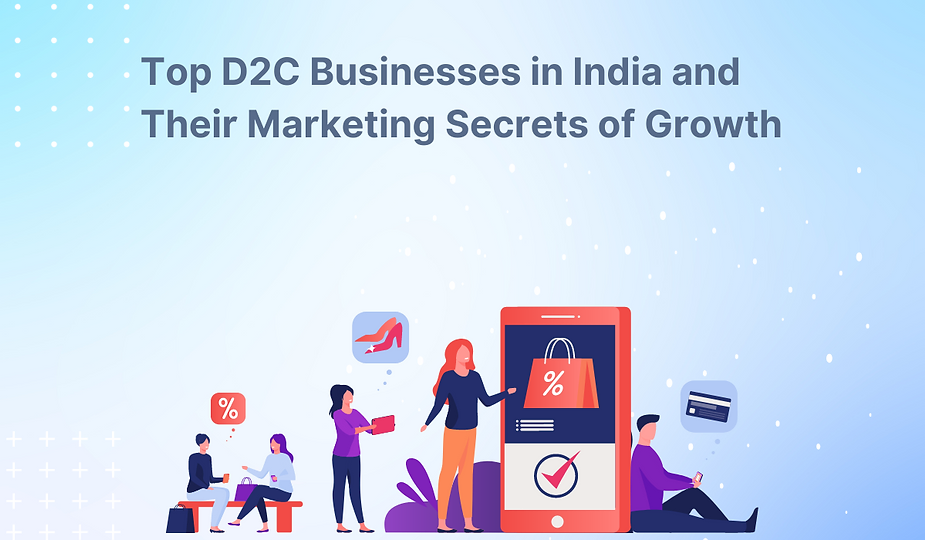The pandemic has had a profound impact on India’s retail environment. Due to the nationwide lockdown and social segregation measures, retailers have experienced record-breaking digital sales. Customers increasingly anticipate safe, contactless deliveries to their doorsteps. The D2C enterprises expanded quickly during the same time frame. There has been an explosion of niche D2C companies across a number of industries, including (FMCG) Fast Moving Consumer Goods, Fashion, Cosmetics, and Furniture. Without a doubt, everyone has been significantly impacted by the internet’s quick spread. Reaching consumers is now simpler than ever.
Since India’s digital infrastructure has developed over time, businesses have started to choose the direct-to-consumer (D2C) strategy because it provides a low barrier-to-entry eCommerce method that enables manufacturers and consumer-packed goods brands to sell directly to consumers.
Successful D2C businesses in India:
Mamaearth
In 2016, parents Varun and Ghazal Alagh created MamaEarth. Mamaearth’s marketing strategy is geared toward other parents searching for toxic-free products as a D2C brand that competes in the baby and adult care markets.
The revenue of Mamaearth surpassed INR 500 crore in FY21. Back then, they mainly relied on word-of-mouth recommendations to market their products. They currently market using social media influencers to broaden their reach. Mamaearth is one of the first FMCG companies to increase sales of products offered in offline shops as well as products sold online through Amazon and Flipkart.
Licious
The founders of Licious, a D2C meat processing firm that provides consumers with fresh meat, are Abhay Hanjura and Vivek Gupta. Their revenue increased to $133 million as of 2021. With its headquarters in Bengaluru, Licious uses a farm-to-fork business model and controls the entire supply chain. In other words, Licious has total authority over order processing, order storage, and delivery. Licious employs customized packaging with photographs of its clients next to its logo on the outside. The freshness, quality, and 90–120 minute delivery speed of their products are a reflection of their maxim to only sell food that they would eat themselves.
Nykaa
Falguni Nayyar established the cosmetics and fragrance company Nykaa in 2012. This D2C startup operates under an inventory-based approach. Nykaa purchases goods directly from producers and stores them in authorized warehouses located in major cities. They are available for purchase on the Nykaa online as well as in their three different offline retail formats: Nykaa Luxe, Nykaa On Trend, and Kiosks. The store initially just had online sales, but starting in 2015, they also opened 76 physical locations. There are currently 84 people, spread out throughout 40 cities. Nykaa publishes
instructional videos and the Nykaa Beauty Book and mainly relies on social media, YouTube, and content marketing to expand its audience. Their revenue surpassed INR 2,400 crore as of 2021.
boAt
Electronics D2C brand Boat Lifestyle sells cables, speakers, and earphones. 2016 saw the founding of the business by Aman Gupta and Sameer Mehta. The company reported INR 1500 crore in sales for FY2021. It’s interesting to note that Boat Lifestyle’s marketing methods place their customers at the core of their product research by taking into account both their requirements and desires as well as their behavioral patterns. The basic idea is that everybody who purchases a Boat product becomes a member of the Boat family. They are even jokingly referred to as “Boatheads,” and it is this distinctive personal touch, in addition to the product’s accessibility and robustness, that has allowed the business to succeed. Strategies used by boats:
· Continuous rounds of creativity and improvisation.
· Instead of just being a consumer electronics company, they are promoting themselves as a lifestyle brand.
· A broad and expanding selection of products.
· Focusing on Gen Z and millennials as their intended demographic to wow.
· Using social media as the main avenue for digital marketing.
SUGAR cosmetics
As its name suggests, SUGAR cosmetics is a makeup and cosmetics company that has grown to become one of the top direct-to-consumer companies. Vineeta Singh and Kaushik Mukherjee founded the company in 2012 with the goal of giving Indians access to makeup that is both inexpensive and suitable for their skin tone. They provide everything from skincare to beauty kits, small sets, and accessories like brushes.


